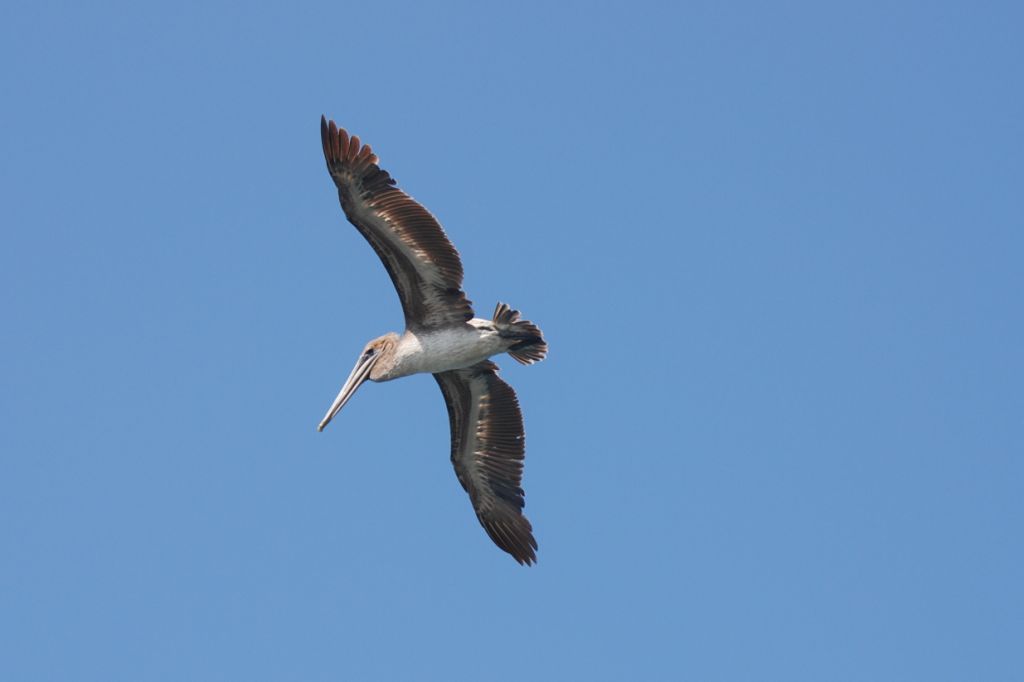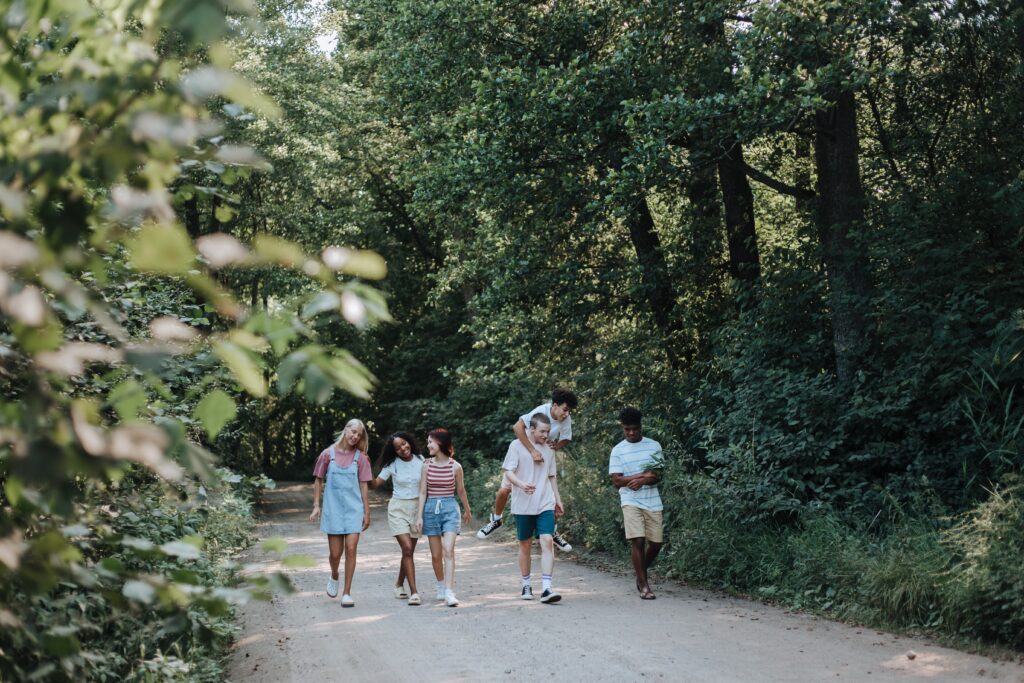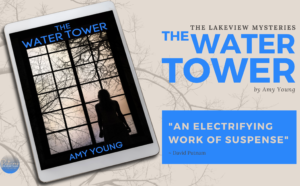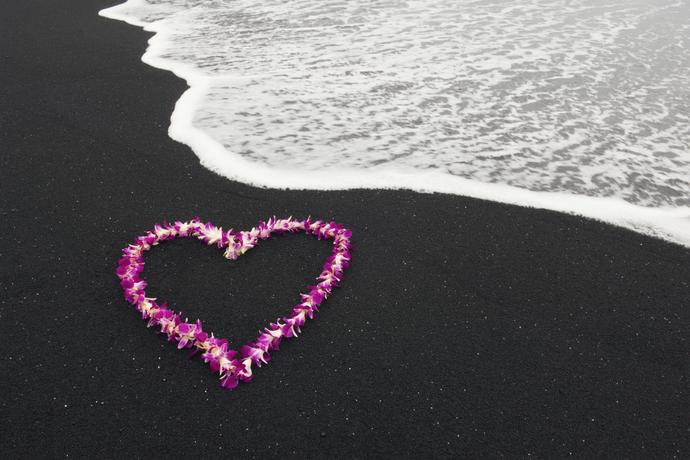He’s Near
November 11th, 2023Hope
November 4th, 2023The Amish Beauty and the Beast
October 17th, 2023She’s an Amish beauty with a love of reading, hiding a painful secret. He’s a reclusive, scarred military hero who won’t let anyone in. Can true love really be enough?
On her way home from the bookstore, Belle’s buggy crashes in front of the old mansion that everyone else avoids, of all places. Though she just moved to Unity, Maine, she’s already heard the rumors of the vicious beast of a man who lives there, tormented by tragedies of his past. But Belle’s not afraid of monsters.
What she finds inside the mansion is not a monster, but a man. Scarred both physiologically and physically by the horrors of military combat, Cole’s burned and disfigured face tells the story of all he lost to the war in a devastating explosion. He’s been hiding from the world ever since.
After Cole ends up hiring her as his housekeeper and caretaker for his firecracker of a grandmother, Belle can’t help her curiosity as she wonders what exactly Cole does in his office all day.
Why is Cole’s office so off-limits to Belle? What is he hiding in there?
A mysterious hand-written letter, a sweet dog named Beast, buried regrets, and their mutual love of books will either bring them closer or tear them apart, but only if Cole can lower his guard and let someone in again.
ISLAND BREEZES
I know the story of Beauty and the Beast but have never read it.
I like The Amish Beauty and the Beast much better. It has tears, smiles and surprises.
I knew what I hoped the ending would be but was never sure how it would turn out.
This is a short book that you won’t want to put down until you reach the end. It caused me to lose some sleep.
Thank you, Ashley Emma, for the Amish version of this fairy tale. I look forward to more of these fairy tales.
***Book received as a gift from the author.***
Visit www.AshleyEmmaAuthor.com to download free eBooks by Ashley Emma!
Ashley Emma wrote her first novel at age 12 and published it at 16. She was home schooled and knew since she was a child that she wanted to be a novelist. She’s now an award-winning USA Today bestselling author of over 20 Amish fiction books.
Ashley has a deep respect and love for the Amish and wanted to make sure her Amish books were genuine. When she was 20, she stayed with three Amish families in a community in Maine where she made many friends and did her research for her Amish books. To read about what it was like to live among the Amish, check out her book Amish for a Week (a true story).
Ashley’s novel Amish Alias was a Gold Medal Winner in the Global Book Awards 2021. Her bestselling book Undercover Amish received 26 out of 27 points as a finalist in the Maine Romance Writers Strut Your Stuff novel writing competition in 2015. Its sequel Amish Under Fire was a semi-finalist in Harlequin’s So You Think You Can Write novel writing competition also in 2015. Two of her short stories have been published online in writing contests and she co-wrote an article for ProofreadAnywhere.com in 2016. She judged the Fifth Anniversary Writing Contest for Becoming Writer in the summer of 2016.
Ashley owns Fearless Publishing House in Maine where she lives with her husband and four children. She is passionate about helping her clients self-publish their own books so they can build their businesses or achieve their dream of becoming an author.
Death and the Sisters
October 17th, 2023Death and the Sisters
by Heather Redmond
September 25 – October 20, 2023 Virtual Book Tour
Synopsis:

The tangled relationships between Frankenstein author Mary Shelley, poet Percy Bysshe Shelley, and Mary’s stepsister Jane Clairmont form the backdrop for an intriguing historical mystery, set in London in 1814, that explores the complex dynamic between sisters and the birth of teenaged Mary’s creative genius.
London, 1814: Mary Godwin and her stepsister Jane Clairmont, both sixteen, possess quick minds bolstered by an unconventional upbringing, and have little regard for the rules that other young ladies follow. Mary, whose mother famously advocated for women’s rights, rejects the two paths that seem open to her—that of an assistant in her father’s bookshop, or an ordinary wife. Though quieter and more reserved than the boisterous Jane, Mary’s imagination is keen, and she longs for real-world adventures.
One evening, an opportunity arrives in the form of a dinner guest, Percy Bysshe Shelley. At twenty-one, Shelley is already a renowned poet and radical. Mary finds their visitor handsome and compelling, but it is later that evening, after the party has broken up, that events take a truly intriguing turn. When Mary comes downstairs in search of a book, she finds instead a man face down on the floor—with a knife in his back.
The dead man, it seems, was a former classmate of Shelley’s, and had lately become a personal and professional rival. What was he doing in the Godwins’ home? Mary, Jane, and Shelley are all drawn to learn the truth behind the tragedy, especially as each discovery seems to hint at a tangled web that includes many in Shelley’s closest circle. But as the attraction between Mary and the married poet intensifies, it sparks a rivalry between the sisters, even as it kindles the creative fire within . . .
Praise for Death and the Sisters:
“Death and the Sisters is a terrific blend of gritty history with a mystery that will keep readers turning pages. Impeccably researched and imaginative, Redmond’s first Mary Shelley Mystery immerses readers in the drama of young Mary Godwin and her family, as well as her budding romance with Percy Shelley, as they work together to solve a wonderfully bookish murder. I thoroughly enjoyed this series kick-off and can’t wait for the next story!”
~ Susanna Craig, author of The Lady Knows Best
“Death and the Sisters is a rip-roaring murder mystery with twists and turns that introduces teenaged Mary Godwin, not yet the author of the immortal work Frankenstein, as an amateur detective. Redmond’s foray in the world of rational atheists in early 19th century London is a mesmerizing, forceful delight.”
~ Eilis Flynn, author of The Riddle of Rym
“Crafted with vivid historical detail, an artfully twisted plot, and engaging characters, Death and the Sisters is an excellent start to what I hope will be a long-running series.”
~ Dianne Freeman, author of the award-winning Countess of Harleigh Mysteries
“It might be the way London comes to life in all of its dark and gritty complexities, or the dynamics between Mary and her step-sister, Jane, as they set out to find the killer of the man who they discover dead in the bookshop. Everyone is a suspect—even Percy Shelley who has caught the eye of the women in the household. Propulsive and immersive, Heather Redmond is at the top of her game until the intense and satisfying end.”
~ Mary Keliikoa, author of Hidden Pieces
“An intrepid cast of characters, a stunningly atmospheric 19th-century London, and a riveting murder… Highly recommend.”
~ Melissa Bourbon, bestselling author
Book Details:
Genre: Historical mystery
Published by: Kensington
Publication Date: September 2023
Number of Pages: 320
ISBN: 9781496737991 (ISBN10: 1496737997)
Series: Mary Shelley Mystery, 1
Book Links: Amazon | Barnes & Noble | BookShop.org | Goodreads | Kensington
Read an excerpt:
“Come, Mary.” Jane flopped onto her bed. “Tell us a story about the prisoner ghosts wailing.”
“I’ll have to think it up,” Mary said and then began to quote. “‘This relation is Matter of Fact, and attended with such Circumstances as may induce any Reasonable Man to believe it.’”
“What’s that?” Jane asked. The floor creaked as she kicked off her slippers and knocked them to the floor.
“Defoe, I think,” Mary said, already considering the form of her story. If only Mother had written such fanciful tales, to give her ideas on how to construct them. “I’ll consult his works in the bookshop for further inspiration. It seems like quite a good start to a ghost story.”
Mary placed her slippers next to Jane’s and walked down in her stocking feet, hugging the wall so as not to set off the worst of the creaking stairs. If Mamma heard her, she’d be set to mending something. Her stepmother never thought about the cost of candles when she could make her daughters work themselves into exhaustion after dark.
The bookshop’s interior door hung open. Very odd, as Mamma was particular about making sure that the smells of domestic life, particularly cooking odors, did not damage the books.
Mary shrugged, glad she had come downstairs, because if Mamma had been the first to notice, she’d have no doubt blamed Mary. She lit the lantern kept in readiness for customers who wanted to browse in the dark corners.
While she knew exactly where Defoe was kept, she first went to a back corner of the shop and dropped to her knees, then pulled out a much-loved volume that Mamma kept in stock because she knew that it sold, even though it was anything but highbrow or philosophical. Ann Radcliffe’s The Romance of the Forest. Feeling a little breathless, like a Gothic heroine about to swoon, she opened the book to her favorite page. With the lantern held over the engraving, she examined the bare legs of the man removing a blindfolded girl from a house.
She bit her lip as she looked over the engraved musculature, feeling a familiar shiver dance up through her body. Did Shelley have legs so magnificent? He certainly possessed the broad shoulders and narrow waist of the figure on the page. She set down the lantern when it shook in her hand.
“Oh, to see a form like that,” she whispered to herself. None of her Scottish suitors had possessed a body she wanted to caress. As such, none of them had enticed so much as a kiss from her. After a last heated glance, she closed the book and tucked it away again.
The next shelves were in front of the bow windows. The Juvenile Library was shelved there, at the perfect height for children. Works of historical merit were on the other side. Mary rose.
Her foot twisted as she took the first step. She grabbed for the edge of the bookcase with one hand, the other gripping the lantern tightly. Her fingers were trembling by the time she righted herself. She reached down and swiped at her foot. Something sticky coated her fingers. What was on the floor?
“Honestly,” she muttered to herself. More cleaning. She set the lantern on the bookcase and walked past the windows. Slatted lines from the shutters were illuminated by the oil lamp that burned all night at the corner of the road.
Distracted by the sudden reflected light, she tripped again. “Blast,” she cried.
When she tried to take another step forward, her way was blocked by something solid. Confused, she prodded it with her foot. It felt warm, dry, and slightly yielding. She backed up to take the lantern in her hand again, then cupped the side of it with her hand to keep the illumination from the road. When she reached the mass again, she held the lantern out over the floor.
Her mouth dropped open when she saw what lay in front of her. A man, like something out of a painting of the French Revolution, was sprawled on the floor. Facedown. She swept the lantern over his body. Her hand shook as she saw first one knife, then another.
The first was impaled in his back. The other, in the mysterious recesses between his legs.
“Faith!” Wobbly, Mary blinked hard, then forced herself to kneel down beside the sprawled figure, to touch the man’s hand.
Still warm. She squeezed it, feeling that strange sensation of callused male flesh under hers, then dropped the hand. What was she doing? Molesting a corpse?
She scooted back, her eyes closed, then opened them again, feeling her lips tremble at the sight of the dark blue velvet coat, the dark stain around the knife gleaming wetly in the light. She knew that coat. Shelley! That fine figure of a man, ended so cruelly. They had just seen him leave not twenty minutes earlier. Had he been accosted in the street and dumped here?
“I could have loved such a being.” Tears sprang to her eyes, and she let them fall, keenly feeling her sensibility. Hadn’t he said he was a new father? And his poor young wife, not even twenty yet, a widow.
“Mary?”
Drat that Jane. Could she not offer up a moment’s solitude to anyone?
Her stepsister’s footsteps came closer, along with the bobbing of a candle flame.
“Don’t come any closer,” Mary warned. She set the lantern down.
Ignoring her, Jane came down the space between the bookshelves and turned in the nook in front of the windows.
“What are you doing?” she asked.
Mary scrambled to her feet, hoping to block her sister’s view. The candle wavered as Jane took in the scene. She gasped loudly.
“What,” Jane asked, “is that?”
“Knives,” Mary said. “Murder has been done here.”
“What?” Jane repeated, some frantic power coming into her voice. “Papa?”
“No,” Mary said, grabbing the candleholder before the candle dropped. “Shelley.”
She saw what was going to happen and held up her other hand, hoping to forestall it. But she failed, and Jane, coming closer, screamed. Mary bent under the onslaught and grabbed her sister’s hand.
“Hush,” she begged, pulling her away. “We have to tell Papa before the watch comes.”
Though Jane resisted, Mary pulled her through the bookshop, then forced her to sit on the steps and hold the candle while she went back for the lantern. She set it on the table in the hall.
“Stay here,” she commanded.
“But,” Jane whispered. “But the body.”
“Papa will know what to do.”
“But the watch.”
“Papa should call them, not us. Do you want him surprised?”
“The bookshop,” Jane said next.
“Yes, it’s very bad,” Mary agreed.
“It isn’t S-Shelley,” Jane stuttered. “He just left.”
Mary pulled the handkerchief from her sleeve and tucked it into Jane’s unresisting hand. “It must be,” she said. “Who else? Cry quietly, please.” Hoping her sister obeyed, she picked up her skirts and ran up the steps to her father’s library.
***
Excerpt from Death and the Sisters by Heather Redmond. Copyright 2023 by Heather Redmond. Reproduced with permission from Heather Redmond. All rights reserved.
Author Bio:

Heather Redmond is an author of commercial fiction and also writes as Heather Hiestand. First published in mystery, she took a long detour through romance before returning. Though her last British ancestor departed London in the 1920s, she is a committed anglophile, Dickens devotee, and lover of all things nineteenth century.
She has lived in Illinois, California, and Texas, and now resides in a small town in Washington State with her husband and son. The author of many novels, novellas, and short stories, she has achieved best-seller status at Amazon, Barnes and Noble, and other retailers. Her 2018 Heather Redmond debut, A Tale of Two Murders, has received a coveted starred review from Kirkus Reviews.
Catch Up With Heather Redmond:
www.HeatherRedmond.com
Goodreads
BookBub – @heatherredmond1
Instagram – @hiestandheather
Twitter – @heatheraredmond
Heather Hiestand Redmond’s Reader Group on Facebook
Tour Participants:
Visit these other great hosts on this tour for more great reviews, interviews, guest posts, and opportunities to WIN in the giveaway!
ENTER FOR A CHANCE TO WIN:
This is a giveaway hosted by Partners in Crime Tours for Heather Redmond. See the widget for entry terms and conditions. Void where prohibited.
Get More Great Reads at Partners In Crime Tours
Live in Peace
October 14th, 2023If possible, so far as it depends on you, live in shalom with all people.
Never take your own revenge, loved ones, but give room for God’s wrath — for it is written, “Vengeance is Mine; I will repay,” says Adonai.
Rather, “If your enemy is hungry, feed him; if he is thirsty, give him a drink. For by doing so you will heap coals of fire upon his head.”
Romans 12:18-20 Tree of Life Version
Shalom – Hebrew for peace
Adonai – the Lord
The Water Tower
October 10th, 2023The Water Tower
by Amy Young
October 9 – November 3, 2023 Virtual Book Tour
Synopsis:

Josie Ashbury was a successful Hollywood actress with a booming career—until an on-set breakdown sends her back to her small Ohio hometown to recover. Taking a job teaching at her old high school, Josie is beginning to put the pieces of her life back together when one of her students dies under suspicious circumstances. The police close the case quickly, without any real answers. Josie is determined to find the truth behind the girl’s death.
At the same time, Josie is battling demons of her own. As she faces debilitating insomnia that leaves her with gaps in her memory, she dives into the tangled secrets surrounding the investigation. When she finally unravels the web, she discovers that the truth lies much closer to home than she could have ever imagined.
Praise for The Water Tower:
“Start with a suspicious death of a beloved student, add a devoted former starlet turned drama teacher, and a dash of the police closing the case far too quickly, and you have the makings of a twisting and propulsive mystery. Amy Young’s The Water Tower will keep you flipping the pages to find out who killed the politician’s young daughter, and then have you checking if your teenager is where they should be tonight.”
~ Mary Keliikoa, multi-award nominated author of HIDDEN PIECES and the PI Kelly Pruett mystery series
“The Water Tower is an electrifying work of suspense that depicts a wonderful hometown setting. This slow-burn mystery with sparkling prose has a well-crafted plot that is at once engrossing and fully realized from beginning to end. I highly recommend this engaging mystery.”
~ David Putnam, Bestselling author of the Bruno Johnson series and Dave Beckett series
Book Details:
Genre: Mystery
Published by: Level Best Books
Publication Date: June 20, 2023
Number of Pages: 290
ISBN: 9781685122775
Series: The Lakeview Mysteries, Book 1
Book Links: Amazon | Barnes & Noble | BookShop.org | Goodreads
Read an excerpt:
Chapter 1
She stood on the water tower, looking at the skyline she had only observed from the ground. You really could see the whole town from up here. Funny how your whole life can fit into one 360-degree glance. Peering down at the ground, she was no longer able to see individual blades of grass, all of them blurring into a sea of perfect emerald green. To her right was the roof of Lakeview High School, looking small from this vantage point. She felt as though if she leaned over far enough, she could almost touch it. But that was ridiculous; the school had to be several hundred feet away. Her vision came in and out of focus as she swayed, thinking about her life, her past, her future.
In her three years at the school, she had never been up on the tower. No one she knew had been up here, either. Most students wouldn’t dare to scale it. Too scared of getting caught, too scared of breaking the rules, too scared of living. When she looked down at the ground, she thought she could see movement, like little grass men dancing and hopping around through a crowd of their peers. Kind of like high school. More like, exactly like high school. Everyone looks the same; maybe some are a bit taller, a bit shorter, a bit wider, but everyone dressed in essentially the same uniform, hopping over one another, trying to make their mark.
How many feet above the ground was she—50, 60 feet? Was that high enough to kill you, or maybe just break a few bones? It would probably depend on how you hit the ground. Here she was, high above the town, pondering the angle at which you might hit the ground and live through the fall, the velocity at which an object might fall from here.
Her body felt warm all over, despite the crisp air of late fall, and she took off her jacket and threw it aside. She leaned against the rail and spread her arms, allowing the breeze to blow through her, inhabiting every cell for just a moment, before moving off in another direction to go dance with someone else. Her 17 years had all been spent here, in this one place, in this small, boring town where, it seemed, nothing was all that was destined to happen.
The clock tower chimed; it was 11:00. She felt she had eternity in front of her, the rest of this night, the rest of her life, stuck here in this town. Would she ever get out? Did it even matter if she did? She thought about the college catalogs arriving at home, the hundreds of pages of sales pitches clamoring for her family’s money. The sprawling campuses, the smiling students, the serious, but friendly, professors—what was the point? She would just end up back here, raising the same family as her friends, living the same life that her kids would eventually live.
Reaching out her slender arm, she twirled her wrist. She could hardly wait for graduation when, everyone said, “real life” would begin. “I can’t wait to get out of here,” her friends exclaimed, dreaming of big cities and even bigger lives in far off places: Chicago, Los Angeles, New York, anywhere but here. But she knew they would return, just like their parents, raising 2.5 kids with a Labradoodle and a balding husband in one of the best-little-suburbs in the country. Was it really so bad? She watched all these super-educated women who had given up their careers to stay home and clean up after the kids and drive to soccer practice, instead of changing the world as they’d so hopefully planned when plotting their escape years earlier. Was that her fate? Was that what awaited her now? Dozens of similar thoughts swirled and crashed like waves in front of her, mixing in a fantastic spray of colors, lights, and sounds.
She was dead before she hit the ground.
***
Excerpt from The Water Tower by Amy Young. Copyright 2023 by Amy Young. Reproduced with permission from Amy Young. All rights reserved.
Author Bio:

Amy Young is an author, comedian, and actor based in Cleveland. After spending a decade in Los Angeles working in the entertainment industry and writing her debut novel, The Water Tower, she returned to Ohio to be closer to family. Amy is working on her second book, a thriller, and in her free time she enjoys going to the theatre, bingeing reality TV, and spending time with her husband and many, many cats. She has a B.A. in English from Kenyon College.
Catch Up With Amy Young:
AuthorAmyYoung.com
Goodreads
BookBub – @authoramyyoung1
Instagram – @amypcomedy
Twitter – @authoramyyoung
Facebook – @authoramyyoung
TikTok – @amypyoung1
Tour Participants:
Visit these other great hosts on this tour for more great reviews, interviews, guest posts, and opportunities to WIN in the giveaway!
ENTER FOR A CHANCE TO WIN:
This is a giveaway hosted by Partners in Crime Tours for Amy Young. See the widget for entry terms and conditions. Void where prohibited.
Get More Great Reads at Partners In Crime Tours
Love
October 7th, 2023The one who does not love does not know God, for God is love.
The love of God was revealed among us by this — that God sent His one and only Son into the world so that we might live through Him.
This is love — not that we have loved God, but that He loved us and sent His Son as an atonement for our sins.
1 John 4:8-10 Tree of Life Version
Murder at Midnight
October 3rd, 2023Murder at Midnight
by Katharine Schellman
September 18 – October 13, 2023 Virtual Book Tour
Synopsis:

Perfect for fans of Deanna Raybourn and Ashley Weaver, when a body is found shot to death after an unexpected snowstorm, Lily Adler quickly realizes that some people will stop at nothing to bury their secrets.
Regency widow Lily Adler is looking forward to a quiet Christmastide away from the schemes and secrets she witnessed daily in London. Not only will she be visiting the family of her late husband; she will be reunited with Captain Jack Hartley, her friend and confidante, finally returned after a long voyage at sea.
But secrets aren’t only found in London. Jack’s younger sister, Amelia, is the center of neighborhood scandal and gossip. She refuses to tell anyone what really happened, even when an unexpected snowstorm strands the neighborhood families together after a Christmas ball. Stuck until the snow stops, the Adlers, Hartleys, and their neighbors settle in for the night, only to be awakened in the morning by the scream of a maid who has just discovered a dead body.
The victim was the well-to-do son of a local gentleman–the same man whose name has become so scandalously linked to Amelia’s.
With the snow still falling and no way to come or go, it’s clear that someone in the house was responsible for the young man’s death. When suspicion instantly falls on Jack’s sister, he and Lily must unmask the true culprit before Amelia is convicted of a crime she didn’t commit.
Praise for Murder at Midnight:
“Delightful . . . Historical mystery fans will devour this holiday treat.”
~ Publishers Weekly
“A plummy period whodunit with a colorful collection of suspects.”
~ Kirkus Reviews
Book Details:
Genre: Historical mystery
Published by: Crooked Lane Books
Publication Date: September 2023
Number of Pages: 320
ISBN: 9781639104321 (ISBN10: 1639104321)
Series: A Lily Adler Mystery, 4
Book Links: Amazon | Barnes & Noble | BookShop.org | Goodreads | Penguin Random House
Read an excerpt:
Lily sat bolt upright. Where had the sound come from? It hadn’t been loud . . . another part of the house? For a moment, in the pressing silence, she wondered if she had drifted back to sleep without realizing it and imagined the whole thing.
But a moment later, the sounds of a commotion rose just outside her window. Lily dashed to the window, throwing it open with some effort and peering out into the swirl of snow and early- morning light.
The guest room she had been given was one of the smaller ones—the better to quickly heat rooms that hadn’t been prepared in advance—and as was typical for such rooms, it lacked a pretty view. Hers looked over what she realized after a moment must be the poultry yard. Darkly clad figures who she could guess were servants stumbled through the thick layer of snow that had fallen, trying to reach the two people in the middle of the yard.
One Lily could see from her vantage only as a still, upright figure, hand outstretched and pointing toward the second person, who lay sprawled on the ground. The one on the ground was half covered by the ice and snow, unmoving.
Lily grabbed the dressing gown from the chair, pulled on her shoes, and ran from the room. In the hallway, a few guests were poking their heads out of their doors, hair tousled and faces creased with sleep, inquiring grumpily if anyone had heard an odd noise.
Lily didn’t stop to consider propriety or worry about what anyone else might think before she yelled “Jack!” as loudly as she could. She didn’t know which room he had been given, but a moment later, a door past the stairs was flung open and the navy captain’s head appeared.
“What is it?” he demanded. He was already dressed and wearing his driving coat over his clothing. That was odd at such an early hour, but Lily didn’t have time to be surprised.
“Downstairs.” In spite of the months they had spent apart, Lily knew she could depend on him to understand and act quickly. “Something happened. We have to help.”
And in spite of those months apart, he didn’t stop to ask questions. More guests were emerging, summoned by Lily’s shout, and questions were beginning to fly back and forth as she dashed down the stairs, Jack on her heels.
They didn’t need to wonder where to go; on the floor below, Mrs. Grantham was following a stately-looking woman who might have been the housekeeper or another upper servant. Their pace was just barely too dignified to be a run, but they couldn’t hide their worry as they disappeared down the steps to the kitchen. Lily and Jack hurried after them.
The servants’ staircase was narrow and cold. At the bottom, servants clustered in the kitchen, talking in shrill, anxious voices as the cook tried to keep some order. The underservants glanced uneasily at Lily and Jack as they came into the kitchen, but no one seemed to know what to do or say. The door to the yard had been left wide open, and the wind blew in gusts of snow and icy morning light. Outside, more servants were gathered, though they parted like a wave as the housekeeper led Mrs. Grantham out to see what had happened.
As Lily and Jack tried to follow, they were stopped by the frail but determined body of the butler, who interposed himself between them and the open door. “Madam, sir, perhaps you would care to return to your rooms? Breakfast will be ready shortly.”
Jack drew himself up, clearly prepared to use his rank to push his way past the aging servant. Before he could say anything, though, and before Lily could think how to reply, Mrs. Grantham turned sharply.
“What is . . .” She trailed off, eyeing Lily and Jack with trepidation. She looked ready to send them on their way with some commonplace assurance. But half a dozen emotions chased their way across her face in that moment, and she instead asked, “Mrs. Adler, how many of the rumors about you are true?”
“That depends on the rumors,” Lily replied calmly, though her heart was pounding. Behind Mrs. Grantham, she could see the limbs of the eerie, still figure sticking out of the snowbank. “Though if you refer only to the ones that are most relevant at this moment . . .” She turned her gaze pointedly toward the body in the snow. “There is indeed some truth to them.”
Mrs. Grantham hesitated, then seemed to make up her mind in a rush. She stepped aside, pulling the confused housekeeper with her. There were boots for the servants lined up next to the door, crusted with mud from repeated use. Lily pulled off her delicate evening slippers, slid her bare feet into the pair that looked closest to her size, and followed as she and Jack were ushered into the yard, their eyes fixed on what awaited them there.
A man dressed in borrowed clothes, his skin white with cold, his hair thick with clumps of ice and snow. He could have fallen, hit his head, been caught in the storm and frozen. He could still be alive, in need of help. He could have had an innocent reason for being out in the storm.
He could have. But this close, Lily could see the snow that had been kicked aside and trampled by half a dozen feet in the servants’ frantic attempts to clear it away. The icy powder was too thick on the ground for her to see the mud of the yard. But it was still stained with red and brown from where the man’s life had leaked away in the night.
The once-snowy linen of his shirt was stained the same color, jagged and torn from the bullet that had ended his life. The gun that had fired it had been unearthed beside him, as snow-logged as his own body. The man’s frozen eyes and mouth were wide open, as though he had not believed until the last moment that whoever had faced him in that yard could be capable of the shot that had ended his life.
***
Excerpt from Murder at Midnight by Katharine Schellman. Copyright 2023 by Katharine Schellman. Reproduced with permission from Katharine Schellman. All rights reserved.
Author Bio:

Katharine Schellman is a former actor and one-time political consultant. These days, she writes the Lily Adler Mysteries and the Nightingale Mysteries. Her books, which reviewers have praised as “worthy of Agatha Christie or Rex Stout” (Library Journal, starred review), have received multiple accolades, including being named a Library Journal Best Crime Fiction of 2022, a Suspense Magazine Best Book of 2020, and a New York Times editor’s pick in June 2022. Katharine lives and writes in the mountains of Virginia in the company of her husband, children, and the many houseplants she keeps accidentally murdering.
Catch Up With Katharine Schellman:
www.KatharineSchellman.com
Goodreads
BookBub – @KatharineSchellman
Instagram – @katharinewrites
Facebook – @katharineschellman
Tour Participants:
Visit these other great hosts on this tour for more great reviews, guest posts, and opportunities to WIN in the giveaway!
Join In for a Chance to WIN!
This is a giveaway hosted by Partners in Crime Tours for Katharine Schellman. See the widget for entry terms and conditions. Void where prohibited.
Get More Great Reads at Partners In Crime Tours
Dead West
September 29th, 2023Dead West
by Linda L Richards
September 4 – 29, 2023 Virtual Book Tour
Synopsis:
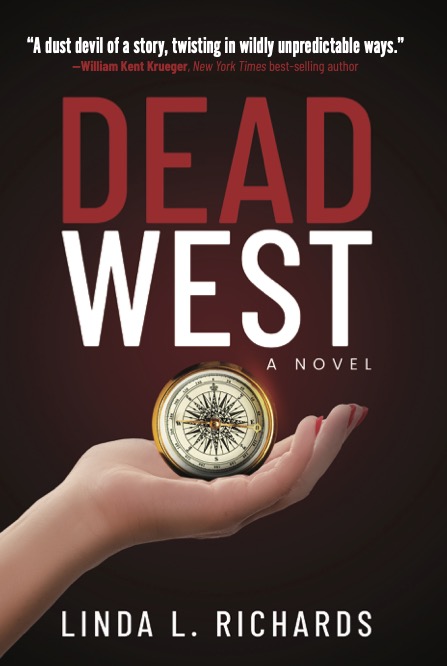
Still struggling towards the light, this time the assignment is to save, not kill.
Taking lives has taken its toll. Her moral justifications have faltered. Do any of the the people she has killed — some of them heinous, but all of them human — deserve to die?
Her next target is Cameron Walker, a rancher in Arizona. When she arrives at his remote desert estate to carry out her orders, she discovers that he is a kind and beautiful man. After a lengthy tour of the ranch, not only has she not killed him, she’s wondering who might want him dead.
She procrastinates long enough that a vibe grows between them. At the same time, she learns that he’s passionate about wild horses and has been fighting a losing political battle to save the mustangs that live on protected land near his property. He’s even received death threats from those who oppose him.
She finds herself trying to protect the man she was sent to kill, following a trail that leads from the desert, to the Phoenix cognoscenti, to the highest offices in Washington, DC. Along the way she encounters kidnappers and killers, horse thieves and even human traffickers. Hopefully she can figure out who ordered the hit before they hire someone else to execute the assignment.
Praise for Dead West:
“Linda L. Richards delivers yet another riveting entry in her hired killer series. Set mostly in Arizona desert country, Dead West is a dust devil of a story, twisting in wildly unpredictable ways and with a powerful emotional center. But this book isn’t just a marvelously compelling thriller; it also cries out passionately for protection of the endangered wild horses of the West. Kudos to Richards for seamlessly weaving an important message into the fabric of a terrific tale.”
~ William Kent Krueger, New York Times bestselling author
“When a contract killer’s wounded conscience begins to awaken, it only heightens the dangers of her profession. In Dead West, the incomparable Linda L. Richards poses the possibility of redemption and recovery for her tragic heroine, all while sending her – and us – on a deadly thrill ride through the stunning Arizona wilderness.”
~ Clea Simon, Boston Globe bestselling author
Book Details:
Genre: Thriller, Noir, Suspense
Published by: Oceanview Publishing
Publication Date: September 2023
Number of Pages: 320
ISBN: 9781608095124 (ISBN10: 1608095126)
Series: The Endings Series, Book 3
Book Links: Amazon | Barnes & Noble | BookShop.org | Goodreads | Oceanview Publishing
Read an excerpt:
CHAPTER ONE
I’m sitting on a beach. It’s a ridiculous proposition. Fluffy white clouds are scudding through a clear, blue sky. Surfers are running around carrying boards, often over their heads. Then they plunge into a sea that looks deadly to my non-surfing eyes. Palm trees are waving, and the air is so neutral, you don’t have to think about it. Soft, welcoming air. You just float right through.
The view is beautiful. It’s like a movie backdrop. A painting. Something skillfully manufactured to look hyper-real. Textbook paradise, that’s what I’m talking about.
I’m sitting on this beach, trying not to think about the reason I’m here. But it’s hard. Difficult. To not think about it, I mean. I’m here, in paradise, because someone has to die.
Someone will die.
I got the assignment a few days ago. I flew to this island to pull it off.
My target is a businessman who lives on this island in the South Pacific. He is the kind of self-made guy who has achieved every goal in life and would seem to have everything to live for. Only now, apparently, someone wants him dead because here I am, ready for business.
So I stake him out. You need to understand at least the basics of who someone is before you snuff them out. This is the idea that I have. I’m not going all sensitive on you or anything, that’s just how it is. In order to do the best possible job in this business, you need to understand a little about who they are. It’s not a rule or anything, it’s just how I feel.
His name is Gavin White, and I researched him a bit before I got here. He made his fortune in oil and wax, which is an odd enough combo that you perk up your ears. Only it doesn’t seem to matter: the source of the income would seem to have nothing to do with the hit. Would seem to, because there is only so much I can learn about that, really. On the surface, anyway, I can find no direct connection between Gavin White’s livelihood and the death that someone has planned for him and that I am now further planning.
I follow him and his S560 cabriolet all over the tropical island. He makes a few stops. I watch what he does, how he moves and who he interacts with. Some of it might matter. I’m not doing it for my health. I’m watching him so I can determine when I might best have advantage when I go to take him out. There are always multiple times and different places to fulfill my assignment and usually only one—or maybe two—that are virtually flawless. Sometimes not even that. So I watch.
And it’s more than an opportunity I’m looking for, though that can play a part. It’s also a matter of identifying what will make my job not only easier, but also safest from detection. And so I watch. And I wait.
As I follow him, he stops first at a bank. Does some business— I’ll never know what. After that he visits his mom. At least, I guess it is his mom. An older woman he seems affectionate with. From my rental car, I can see them through a front room window. There is a hug and then a wave. It could be a bookkeeper for all I know. But mom is what I guess.
After a while he heads to the beach. He sits on the sand, contemplative for a while. I think about taking him there; full contemplation. But it is crude and much too exposed.
More time passes before he takes off his shoes, leaves them on the beach, and walks into the surf. I leave my car and take up a spot on the sand, just plopping myself down not far from his shoes.
I watch him surreptitiously. It is obvious he did not come to the beach to swim. He is fully clothed and he hasn’t left a towel behind there with his shoes. There is none of the paraphernalia one associates with a visit to the beach, even if this were one that is intended for swimming, which it is not. Signs warn of possible impending doom for those who venture into the water.
“Strong current,” warns one sign under a fluorescent flag. “If in doubt, don’t go out.”
“Dangerous shore break,” warns another. “Waves break in shallow water. Serious injuries could occur, even in small surf.”
I don’t know if Gavin White read the signs, or noticed them, but even though he is still fully clothed, he steps into the water anyway.
First, he gets his feet wet. Not long after, he wades in up to his knees. He hesitates when the water is at mid-thigh, and he stops there. For a while, it seems to me, it is like a dance. He stands facing the horizon, directly in front of where I sit. His shoulders are squared. There is something stoic in his stance. I can’t explain it. Squared and stoic.
Waves break against him, push him back. He allows the push, then makes his way back to the spot where he had stood before.
Before long, he ventures deeper still. The dance. I watch for a while, fascinated. I wonder if there is anything I should do. But no. The dance. Two steps forward, then the waves push him back.
And now he is in deeper still, and further from shore. I see a wave engulf him completely, and I hold my breath. He doesn’t struggle, but then I see him rise, face the horizon, square his shoulders.
The waves are strong and beautiful. And they are eerily clear, those waves. Sometimes I can see right inside them. Careful glass tubes of water, I can even observe that from shore.
For a while he stands like that, facing the horizon—a lull in the action of the waves. And then he is engulfed once again. I hold my breath, but this time he doesn’t rise.
I sit there for a long time, considering. And waiting. My breathing shallow. But he doesn’t reappear.
After half an hour, I text my handler.
“It is done,” is all I say, just as I know she will expect.
It was not my hand, but the mission has been accomplished regardless. No one knows better than me that there are many ways to die.
CHAPTER TWO
There are many ways to die.
I think I have died many times. Certainly, I’ve wanted to.
I died when I lost my child. Died later when I lost my husband, even though by then there was little love left between us. Still. I died.
I died the first time I took someone’s life. At the time it felt like living, but I didn’t yet know the difference. And then there was the time I had to kill someone I loved. I died that time, too.
Sometimes I believe I have died so much that I’ve forgotten how to live. That I should most correctly walk into a waiting undertow just like Gavin White did. I don’t know what stops me, honestly. I don’t. Though there are days when it’s a very close thing.
This isn’t one of those days.
When my phone rings, it tells me the call is coming from Kiribati, a place I’ve barely heard of before. All of her calls are like that. Routed through some other place. They might be chosen for their convenience, but I think they are also selected for the mirth they might provide. I’m not certain she has a wicked sense of humor, but I suspect it, pretty much.
She never used to call me. For a long time, it was text and email only, secure channels always. And then the calls began. I imagined that it meant we had developed some sort of connection. I no longer wonder about that now.
Whatever the meaning, the calls have never been from normal places; they don’t come from the places one might expect. And none have been from the same odd place twice. They are chosen for some reason I don’t understand. Some inside joke I stand outside of. She can be cryptic that way. Another reason I guess I imagined for a while that we belonged.
“That was efficient,” is what she says by way of greeting.
“What do you mean?” I figure I actually know, but it makes no sense to admit that going in.
“He walked into the sea,” she says. How does she know that? It makes me wonder, but not deeply. It would not be the first time I’ve wondered if there is someone who watches the hunter. It would even make a dark sort of sense.
“Yes,” I say, unquestioning. She has her ways. “That’s right. He did.”
“Hmmm,” she says. And then again, “Hmmm.”
“There are many ways to die,” I say, and by now it feels like gospel. Something sacred. And more true than true. “What I really don’t understand,” I say, sailing into a different direction, “is that you said things weren’t going to be like this anymore.”
“Excuse me?” I am put off by her tone. Surprised. It comes to me from a new place. Unexpected. And she doesn’t back away from it. Goes on just as strongly, instead. “What do you mean by that?” It’s a challenge.
“I’m trying to think how you put it,” I say. “Something about how things have been wrong with the world. How we could . . . how we could make it right.”
“Did I say that?”
“You did,” I reply.
“I do maybe remember something like that. Maybe.”
I feel my heart sink a bit at her words. And why? I can’t even quite put my finger on it. It felt, maybe, like I might be part of something. Again. And now? Now I’m not.
“You did say that,” I say it quietly though. Almost as an aside.
“These things take time, as it turns out. One can’t just flip a switch.” I can hear her pushing on, rushing through. “Meanwhile, I’ve got another one for you,” she says, and I’m relieved that she has tacitly agreed to leave the drowned man to sink or swim. Disappointed by how easily the hopeful words she’d fed me not so long ago could be pushed to one easy side. Disappointed and relieved all in one gulp. It’s an odd thing to feel. I find I don’t like it. “So if you’re ready,” she says.
“Another what?” I ask it, but I suspect I know.
“Job,” she replies, and I wonder why I wasted breath.
“I’m ready enough,” I say, though I’m struggling. I struggle every time.
“Good,” she says. “I’ll send you the details, but I think the juxtaposition of these two will amuse you.”
“How so?” And I try not to digest the irony around any aspect of a contract killing being amusing.
“Well, you’ve just been in the Pacific. Water, water everywhere.
And now you’re heading for the desert.” “I am?”
“You are. Right out into it, in fact. The target is in Arizona.” “Phoenix?” Which is all I really know of Arizona.
“You’ll fly to Phoenix, but, no: the target is near a national park.
Rural. A place you won’t have heard of before, I’m betting. I’ll send the details once I’m off this call.”
When I first get off the phone, I try not to think about it too much. It’s like my brain doesn’t want me to pay attention. Or something. But I put off checking my email. I’ll do it later. Right now, there are things that need my attention.
Okay. “Need” would be an overstatement. There are things. I choose to give them my time. Walks in the forest with the dog. Cooking succulent meals for one. And recently, I have taken up plein air painting, simply because it was there.
When I want to paint, I take the dog and my gear and we hike out to some remote spot and I set up my stuff and I paint what I see. Try to paint what I see. The dog meanwhile amuses himself— chasing squirrels, digging holes, sniffing his own butt. He’s very skilled at self-amusement. I’ve never seen anything like it.
In less clement weather we hunker down and brave it out. I make a fire in the fireplace because it’s beautiful, not because we need the warmth.
There is something idyllic to this life. Easy. After a while it gets even easier to forget . . . forget what? Everything, really. It gets easier to forget to remember.
I paint the dog. My online classes have gone well enough, and I have proven to be a good enough student—and the dog a good enough subject—that I end up with a pretty credible representation of him; something I am proud to hang. And even if I wasn’t, it’s not like anyone is ever going to see.
***
Excerpt from Dead West by Linda L Richards. Copyright 2023 by Linda L Richards. Reproduced with permission from Linda L Richards. All rights reserved.
Author Bio:
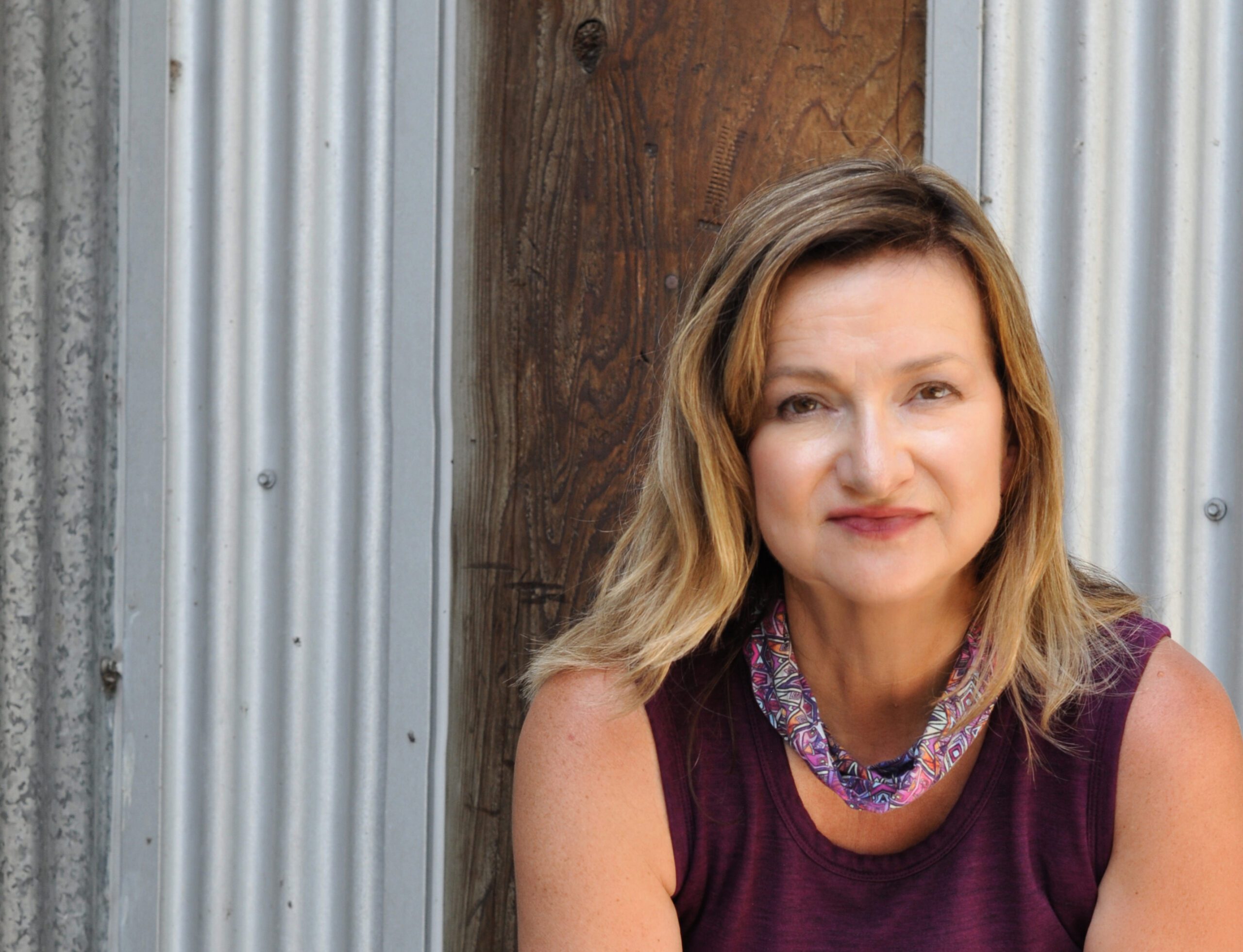
Linda L. Richards is the award-winning author of over a dozen books. The founder and publisher of January Magazine and a national board member of Sisters in Crime, she is best known for her strong female protagonists in the thriller genre. Richards is from Vancouver, Canada and currently makes her home in Phoenix, Arizona. Richards is an accomplished horsewoman and an avid tennis player. She enjoys yoga, hiking, cooking and playing guitar, though not at the same time.
You can find her at:
LindaLRichards.com
Goodreads
BookBub – @linda1841
Instagram – @lindalrichards
Twitter – @lindalrichards
Facebook – @lindalrichardsauthor
TikTok – @lindalrichards
Learn More about Linda in this #AuthorInterview!
Tour Participants:
Visit these other great hosts on this tour for more great reviews, interviews, guest posts, and opportunities to WIN in the giveaway!
ENTER FOR A CHANCE TO WIN:
This is a giveaway hosted by Partners in Crime Tours for Linda L Richards. See the widget for entry terms and conditions. Void where prohibited.


